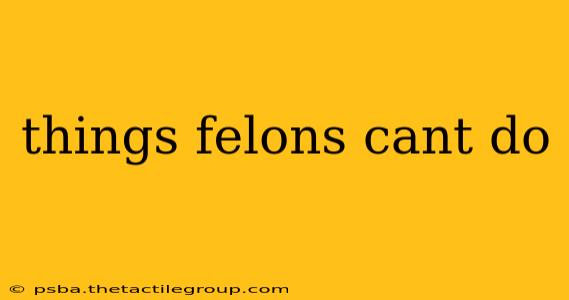Being convicted of a felony significantly alters your life, imposing legal restrictions that extend far beyond serving your sentence. Understanding these limitations is crucial for successful reintegration into society. This guide outlines some key things felons can't do, categorized for clarity. Note that specific restrictions vary by state and the nature of the felony conviction, so this information shouldn't replace consultation with a legal professional.
Voting Rights
One of the most impactful restrictions for many felons is the loss of voting rights. Felony disenfranchisement laws differ widely across states. Some states automatically restore voting rights upon release from prison, while others require completion of parole or probation, or even a separate application process. In some states, certain felonies result in permanent disenfranchisement. It's critical to research your specific state's laws to understand your eligibility.
Gun Ownership
The Second Amendment doesn't apply universally to felons. Federal law generally prohibits felons from possessing firearms, and most states have similar laws. This restriction often applies even after the completion of a sentence. Possession of a firearm by a felon can lead to severe penalties, including additional prison time. There are limited exceptions, which are usually granted through complex legal processes and are highly dependent on the specific crime and state laws.
Employment Restrictions
While not all jobs are off-limits, certain professions are inaccessible to felons due to licensing requirements or background checks. These can include jobs in healthcare, education, finance, and law enforcement. The specifics depend on the nature of the felony and the licensing board's regulations. Some employers may also independently choose not to hire individuals with felony records, although this practice is increasingly being challenged. Transparency and addressing past mistakes during the application process is crucial for increasing employment opportunities.
Travel Restrictions
While not a universal restriction, certain felonies, particularly those involving international crime or national security, can result in travel restrictions, including limitations on international travel and even domestic travel restrictions. These restrictions vary based on the severity of the crime and may be imposed as a condition of parole or probation.
Public Benefits
Access to certain public benefits can be limited for felons, although this area is subject to considerable legal debate and variation among states. This can include housing assistance, student loans, and food stamps. Eligibility requirements vary, and the restrictions often depend on the type of felony and the specific program.
Jury Duty
Felons often lose their right to serve on a jury. This restriction stems from the need for jurors to be unbiased and possess full civil rights. The specific rules regarding jury duty eligibility for felons vary by state.
Professional Licenses
Many professions require licensing, and a felony conviction can significantly impact the ability to obtain or maintain such licenses. This applies to various fields, including medicine, law, real estate, and cosmetology. The specific rules and processes for addressing a felony conviction vary across professions and states.
Understanding Your Rights: Seeking Legal Counsel
This information provides a general overview and is not exhaustive. The specifics of post-conviction restrictions vary dramatically depending on the state, the type of felony, and the specific circumstances of the case. It is essential to consult with a qualified legal professional to understand your rights and options. They can provide tailored advice based on your individual situation and help you navigate the complex legal landscape. Re-entry into society after a felony conviction can be challenging, but with careful planning and legal guidance, a fulfilling life is possible.

